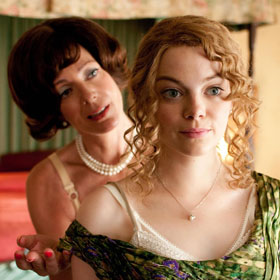The Help Blu-ray

3/5
If you haven’t heard already, there’s been quite a bit of controversy surrounding The Help. The movie, written and directed by green-behind-the-ears Tate Taylor and adapted from the popular novel of the same name by Kathryn Stockett, has received criticism for the way it deals with the Civil Rights Movement in 1960’s Mississippi. Detractors will say that the film depicts African-Americans as, ironically, helpless archetypical stereotypes dependent on the socially conscious white girl for a voice. Or that the protagonist, an ambitious Skeeter (Emma Stone), is exploiting a group of oppressed people to further her own literary aspirations. On the other hand, fans of The Help will tell you the movie is an exposé that sheds light on a dark period in our nation’s history, that it shows a side of racism we might not have thought of, and it does so in an uplifting manner that reaffirms the triumph of human nature.
What is more shocking is that The Help, at its core, is a rather droll movie. Beneath the social context, sentimental soundtrack, and period décor, The Help is just like any feel-good, high-grade tear-jerking blockbuster. There is a clear definition of what is right and what is wrong, and the characters predictably take their sides. In a movie like this the good are steadfast and beyond reproach. No one is evil or bad, they’re only ignorant, and by the end of the film we know they’ll come to see the error of their ways. Those who haven’t yet chosen a side are just waiting for someone brave enough to open their eyes for them. The Help hits its emotional chords, but with the efficiency of a player piano.
After graduating from college, headstrong Skeeter returns home to Jackson, Mississippi with the hope of becoming a famous writer, only to find a sanitized collection of twenty-something debutantes and a seemingly endless stream of brunch dates and spring formals. Armed with a degree in higher education, Skeeter can finally see, as if some magical veil was lifted, the injustices perpetrated by her peers, specifically a chilly Hilly (Bryce Dallas Howard), against their African-American maids. Now she wants to chronicle the ‘help’s’ side of the story. After all, it would make a great book. Skeeter enlists Abilene (Viola Davis) and Minny (Octavia Spencer) as her behind-the-scenes sources to the mechanics of upper crust homes, but of course, because of social taboos, all of this must be done in secret. In the end, morals are tested, friendships are made, and a world is changed.
Despite its formulaic approach, The Help still manages to shine in some respects. Taylor has put together an aesthetically pleasing movie; the Jackson he creates is a vivid, dichotomous landscape of muted earth tones and idyllic pastels, a contrast which may be the only subtle part of the movie. Most of the characters are allowed time to somewhat develop, surprising given the large ensemble cast. Spencer’s Minny, Davis’ Abilene, and Howard’s Hilly are all memorable characters. Stone’s Skeeter alone appears untouched by the end of the film. It’s unfortunate. Even minor characters such as Skeeter’s mom (Allison Janney) and Celia (Jessica Chastain) display more dynamism.
The Help is the type of movie that finds virtue outside of itself. It’s not pushing any envelopes. It’s standard Disney fare. What really makes this movie valuable is as a cultural artifact. The controversy it stirred (there is a whole website devoted to critiquing The Help: acriticalreviewofthehelp.wordpress.com ), which is even more astonishing if you consider how straightforward, and well, bland a story The Help is. In a time when racism is allegedly “over,” it’s interesting to see a movie raise such a complex debate, especially when that movie is so innocuous and artificially sweetened. The Help is not an important film, by any means, but the issues it purports to discuss still are.
For those craving something a little more substantial, the bonus features on the Blu-ray release include two documentaries; one about the making of the film and the other a tribute to the real housemaids of Mississippi. In addition to this, and included on the DVD release as well, are deleted scenes and the music video for Mary J. Blige’s song, “The Living Proof.”
RELATED ARTICLES
Get the most-revealing celebrity conversations with the uInterview podcast!







Leave a comment